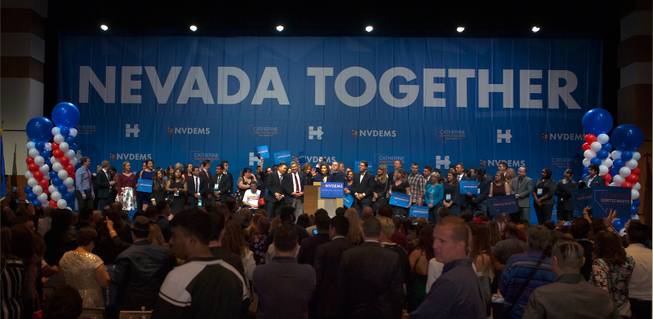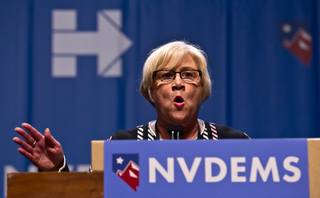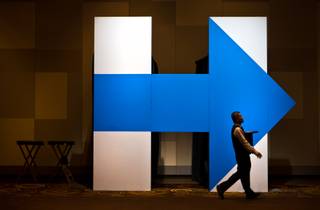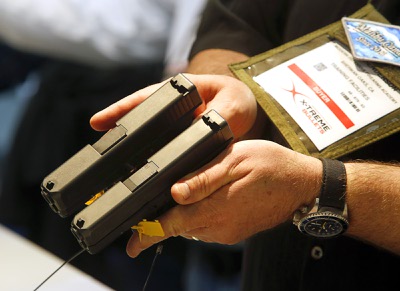
Newly elected senator Catherine Cortez Masto speaks to supporters while joined by family and staff as the Nevada State Democratic Party hosts its 2016 election night watch party with Hillary for Nevada and down-ballot Democratic candidates in Southern Nevada at ARIA Resort and Casino on Tuesday, Nov. 8, 2016.
Thursday, Nov. 10, 2016 | 2 a.m.
Related news
The sagebrush-covered desert expanses of Nevada might not look the picture of urbanization. But the Silver State actually is the third-most urban state in the nation, with Las Vegas remaining one of the fastest-growing urban centers in the West. Mining towns gave way to gambling halls, which eventually gave way to the bustling metropolis of Las Vegas.
Of Nevada’s 2.8 million residents, 2.1 million live in the Las Vegas metro area in Clark County, another 450,000 live in the Reno area, and the rest are scattered across rural counties. Consequently, most of Nevada’s registered voters live in Clark County: 1 million out of a total 1.5 million voters.
That’s why in an election in Nevada, you can lose 16 of the state’s counties but win Clark County and still come out on top. And that’s exactly what happened Tuesday night to U.S. Sen.-elect Catherine Cortez Masto, and with a statewide ballot measure to expand background checks on gun sales and transfers.
Cortez Masto, a former Nevada attorney general, defeated three-term Republican Congressman Joe Heck by a little more than two points. But she beat him by more than 10 points in Clark County, or about 82,000 votes, enough to cancel out the 56,000 vote lead he had in Washoe County and the rural counties.
The dense urban area is a boon for Democrats not just because of its high concentration of Democratic voters, who outnumber Republicans by 140,000 in the county, but also because most of the voters they need to turn out in the state live within a 600-square-mile boundary. And the rest that Democrats need to target live in Washoe County, where Republicans outnumber Democrats by only a few thousand.
“They have the two counties, and if they win those two counties it’s tough for Republicans to win,” said UNLV professor David Damore. “Even in other states where you have a big metro area, it’s nothing as concentrated as it is here in Nevada. It provides efficiency in their get-out-the-vote effort here.”
Even if Democrats don’t win Washoe County, they still can rely on a large enough margin in Clark County to eke out a victory, as Cortez Masto did in the U.S. Senate race.
In this election specifically, Damore pointed to the kind of impact that the unions and other ground-game troops can have on Democratic voter turnout. It was critically important in a cycle where the top of the ticket, Hillary Clinton, didn’t carry the same level enthusiasm as President Barack Obama did in 2008 or 2012, he said.
“The most iconic scenes of this entire election were here: Friday night at Cardenas, mariachi bands roaming through Las Vegas as voters headed to the poll,” Damore said. “That doesn’t exist elsewhere. That, and a strong state party, those are the things that make Nevada different.”
But that can change year to year, and everything depends on who shows up to the polls. Republican consultant Greg Ferraro pointed to Sen. Dean Heller’s election in 2012 as an example of how Republicans can compete even in a year that the state votes for a Democrat at the top of the ticket.
“This isn’t a new reality. This is the way it’s played for a long time,” Ferraro said. “The formula is winning Washoe by a big margin and competing in Clark.”
Regarding Question 1, the ballot measure to expand background checks on gun sales and transfers, voters in the rural counties overwhelmingly opposed the measure. Washoe County rejected it by more than 8 points.
“We knew there would be opposition, and we saw that in the results,” said Jennifer Crowe, a spokeswoman for proponents of the measure. “But we put in a strong effort in Washoe in terms of organizing and working to get out the vote and talking to voters, and we’re proud of that effort and the folks that supported us there.”
Meanwhile, Clark County voters approved the measure by more than 13 points.
“The county tends to undervote and did in 2014, but when Clark shows up, it calls the shots,” Damore said. “That’s the way it’s going to be. It’s not going to change anytime soon.”
So what place do rural Nevadans have in the future of the Silver State?
As the urban population in Las Vegas continues to grow, the share of the state that the rural population makes up is likely to continue diminishing, Damore said.
“They’re already voting above their weight in the population share, and they’re monolithic voters as conservative Republicans,” Damore said. “They’ve got to hope for elections like 2014 where they’re a big influence, as opposed to elections like 2016 when they’re not.”




Join the Discussion:
Check this out for a full explanation of our conversion to the LiveFyre commenting system and instructions on how to sign up for an account.
Full comments policy